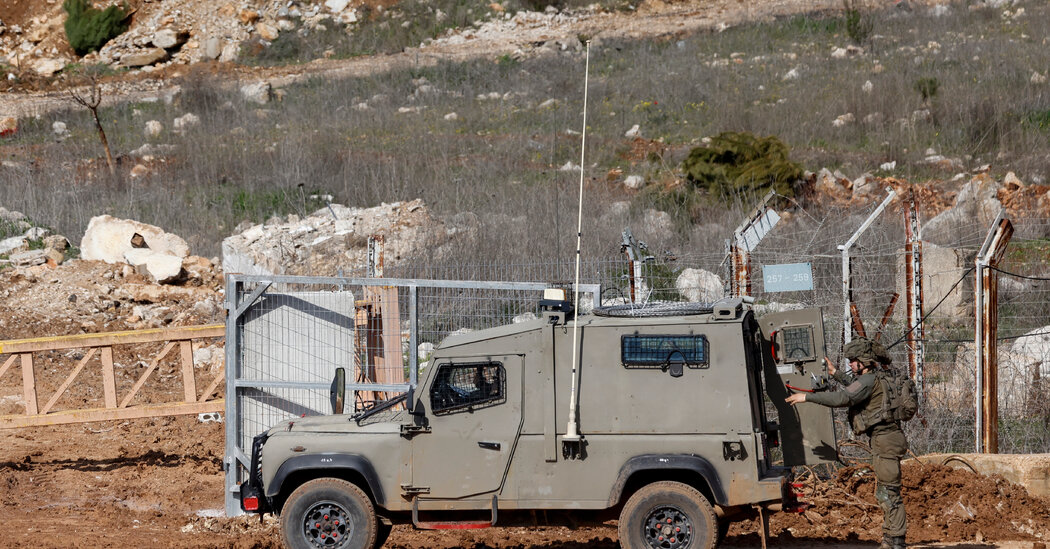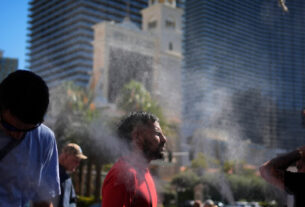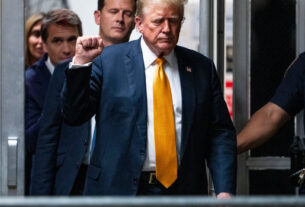Israel said it would remain in a handful of positions in southern Lebanon as the deadline elapsed for the Israeli military and Hezbollah forces to withdraw from the area on Tuesday, raising fears that a sustained Israeli presence could undermine the fragile truce there.
After a cease-fire in November ended the deadliest war between the two sides in decades, both the Israeli military and Hezbollah, the powerful Iran-backed group, were supposed to cede control of southern Lebanon to the Lebanese military by the end of January.
The deadline was ultimately extended to Feb. 18, following deadly violence at the border.
On Monday, Israel announced that its forces would remain temporarily in five “strategic” points just over the border in Lebanese territory until the Lebanese military fully implements its end of the agreement, according to a spokesman for the Israel Defense Forces, Lt. Col. Nadav Shoshani. He declined to say how long the troops would stay there.
The move has set the stage for what could be a renewed bout of violence, with thousands of Lebanese residents still unable to return to occupied towns amid repeated warnings by the Israeli military.
Under the terms of the truce, Hezbollah must also pull out from southern Lebanon, and the Lebanese military is expected to deploy there in force. Israeli officials have repeatedly accused Hezbollah of not upholding its end of the bargain. Although the U.S.-led monitoring committee has praised the Lebanese military’s deployment, the body has not released public data on the extent to which Hezbollah has withdrawn its weapons and fighters from the region.
Last month, Israeli forces killed more than two dozen people as they attempted to enter southern border towns, according to Lebanese officials. The Israeli military said it had fired “warning shots in order to eliminate threats.”
In a speech on Sunday, Hezbollah’s leader, Naim Qassem, vehemently opposed Israel’s intent to remain in Lebanon’s south — which had been relayed to the Lebanese government by U.S. officials in recent days — but stopped short of pledging to resume attacks against Israel.
“Israel must withdraw completely on Feb. 18,” said Mr. Qassem. “This is the agreement.”
He added, “Everyone knows how an occupation is dealt with.”
Despite their objections, Hezbollah and the Lebanese government have no real capability to compel Israel to withdraw.
Lebanon’s new leaders have sought to rally their Arab neighbors and appeal to the United States in a bid to pressure Israel, but they are considered largely powerless. And experts say that Hezbollah, battered by the 14-month war with Israel, is also unlikely to risk resurrecting the conflict in the short term.
However, if Israel does remain indefinitely inside Lebanon, this could strengthen Hezbollah in the long run, regional experts said.
“If Israel stays in those five points, that is absolutely a gift to Hezbollah,” Paul Salem, the vice president for international engagement at the Middle East Institute in Washington, said. “It enables them to say the occupation cannot be ended by diplomacy, and hence that Lebanon continues to need armed resistance.”
Lebanon’s new president, Joseph Aoun, has pledged to bring all arms under the state’s control, a challenge to Hezbollah, which has long wielded inordinate influence over the country. It is unclear how Mr. Aoun will succeed in that endeavor.
The Lebanese military warned civilians on Sunday not to approach southern towns until the military had deployed there. The Lebanese military has accused Israel of adopting a scorched-earth policy in recent weeks, including demolishing and setting fire to homes as it has pulled out of towns and villages. The Israeli military did not immediately respond to a request for comment on that claim.
Israel’s intention to remain in Lebanon comes on the back of mounting tensions in the country. After the Israeli military accused Iran of funneling cash to its proxy Hezbollah through Beirut’s airport, the Lebanese authorities canceled flights from Iran last week. Thousands of Hezbollah supporters later blocked roads leading to the country’s only airport in protest and a United Nations convoy near the airport came under attack.
The violent protests marked one of the first major tests for Lebanon’s new leaders as they attempt to rein in Hezbollah’s inordinate influence over the country.
The Israeli military also appears to have escalated its attacks in Lebanon in the run-up to the deadline for the withdrawal. On Monday, the Israeli military said it had targeted and killed a Hamas commander in the southern Lebanese port city of Sidon, more than 20 miles from the Israeli border.
Patrick Kingsley and Johnatan Reiss contributed reporting.





